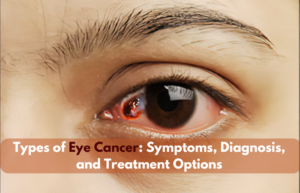Types of Eye Cancer: Symptoms, Diagnosis, and Treatment Options
Eye cancer, though rare, is a serious condition that can affect people of all ages. It occurs when abnormal cells grow uncontrollably in or around the eye, potentially leading to vision loss or other complications if left untreated. Understanding the types of eye cancer, their symptoms, and available treatment options is crucial for early detection and effective management. In this blog, we’ll explore the different types of eye cancer and provide insights into how they are diagnosed and treated.
What is Eye Cancer?
Eye cancer refers to the growth of malignant cells in the eye or its surrounding structures. It can originate in the eye (primary eye cancer) or spread to the eye from other parts of the body (secondary eye cancer). Early diagnosis and treatment are key to preserving vision and preventing the spread of cancer.
Types of Eye Cancer
1. Intraocular Melanoma
Intraocular melanoma is the most common type of eye cancer in adults. It develops in the melanocytes, the cells responsible for producing pigment. This cancer typically affects the uvea, which includes the iris, ciliary body, and choroid.
- Symptoms: Blurred vision, dark spots on the iris, changes in the shape of the pupil, or flashes of light.
- Risk Factors: Light-colored eyes, excessive UV exposure, and older age.
2. Retinoblastoma
Retinoblastoma is a rare type of eye cancer that primarily affects children under the age of 5. It originates in the retina, the light-sensitive tissue at the back of the eye.
- Symptoms: A white glow in the pupil (leukocoria), crossed eyes (strabismus), or redness and swelling in the eye.
- Risk Factors: Genetic mutations inherited from parents.
3. Lymphoma of the Eye
Ocular lymphoma is a type of non-Hodgkin lymphoma that affects the lymphatic system, including the eye. It is more common in older adults or individuals with weakened immune systems.
- Symptoms: Blurred vision, floaters, eye redness, or swelling.
- Risk Factors: Autoimmune diseases, HIV/AIDS, or organ transplantation.
4. Squamous Cell Carcinoma
This type of cancer affects the conjunctiva, the thin membrane covering the white part of the eye. It is less aggressive than other types but can still cause significant damage if not treated.
- Symptoms: A raised, pinkish growth on the eye, irritation, or a feeling of something in the eye.
- Risk Factors: Prolonged UV exposure, fair skin, and older age.
5. Orbital and Adnexal Tumors
These tumors develop in the tissues surrounding the eye, such as the muscles, nerves, and skin. They can be benign or malignant and may affect eye movement and vision.
- Symptoms: Bulging eyes, double vision, or pain around the eye.
- Risk Factors: Genetic predisposition or exposure to radiation.
Diagnosis of Eye Cancer
Early detection is critical for successful treatment. If you experience any unusual symptoms, consult an eye specialist immediately. Diagnostic methods include:
- Comprehensive Eye Exam: To check for abnormalities in the eye.
- Imaging Tests: Ultrasound, MRI, or CT scans to visualize the tumor.
- Biopsy: Removing a small tissue sample for laboratory analysis.
Treatment Options for Eye Cancer
The treatment plan depends on the type, size, and location of the tumor, as well as the patient’s overall health. Common treatments include:
- Radiation Therapy: To destroy cancer cells using high-energy beams.
- Laser Therapy: To target and shrink small tumors.
- Surgery: To remove the tumor or, in severe cases, the entire eye (enucleation).
- Chemotherapy: To treat cancers that have spread beyond the eye.
Prevention and Early Detection
While not all eye cancers can be prevented, you can reduce your risk by:
- Wearing UV-protective sunglasses.
- Scheduling regular eye exams, especially if you have a family history of eye cancer.
- Monitoring for any changes in vision or eye appearance.
Consult a Specialist
If you or a loved one is experiencing symptoms of eye cancer, it’s essential to seek expert care. Dr. Vasundhara Kulkarni a eye doctor in Moshi at Iris Eye Care is a highly skilled ophthalmologist with extensive experience in diagnosing and treating eye conditions, including eye cancer. Her compassionate approach and state-of-the-art facilities ensure that patients receive the best possible care.
Don’t wait—schedule an appointment with Dr. Vasundhara Kulkarni at Iris Eye Care today to protect your vision and overall eye health.
By understanding the types of eye cancer and seeking timely medical attention, you can take proactive steps to safeguard your vision. Share this blog to raise awareness and help others recognize the importance of eye health!

